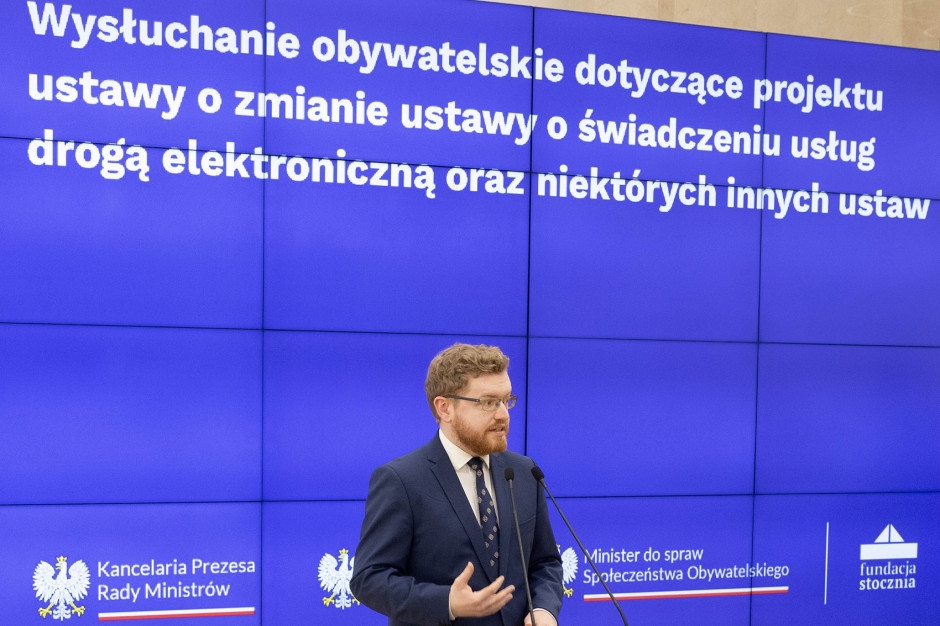The controversial bill is causing great emotions, although some of the opposition's amendments have been adopted.

- Decision-makers in the process of blocking online content will be required to be apolitical. The Digital Affairs Committee unanimously approved this amendment from the Law and Justice party (PiS) to the government's bill.
- Online platforms will have three days to submit the evidence needed to consider a request to block content. This is an amendment approved by the majority of the Confederation.
- However, proposals from opposition clubs to remove the entire controversial content blocking procedure from the bill were not passed.
The government's proposed legislation aims to enable the use of the EU Digital Services Act (DSA) in Poland. Its goal is to increase online security, limit the power of large technology platforms, and empower users. A key part of this regulation is to facilitate the fight against illegal content.
Critics of the bill, however, believe the Ministry of Digital Affairs has gone too far and accuse the bill's authors of attempting to create a mechanism for internet censorship. The bone of contention is the provision that would give the president of the Office of Electronic Communications the power to issue orders blocking access to content published online .
In the new version of the project, the National Broadcasting Council will also have similar powers – in relation to video materials.
This procedure will apply to illegal online publications that meet certain criteria listed in the Act, e.g. threats and harassment based on race, nationality, religion or political affiliation.
The content blocking procedure will not be thrown into the trash, as the opposition wantedPointing to the risk of limiting freedom of speech on the internet, two opposition clubs – Law and Justice and Confederation – initially proposed removing the chapter establishing the procedure for blocking content published online from the draft.
Both amendments were rejected at a meeting of the parliamentary committee on digitalization, innovation, and modern technologies (the first on Wednesday, the second on Thursday, when consideration of the bill continued). However, MPs from the ruling coalition supported some of the changes proposed by the opposition .
The most important of these changes concerns the group of individuals who – within the Office of Electronic Communications or the National Broadcasting Council (KRRiT) – will make decisions regarding content blocking. According to the change proposed by PiS, such individuals cannot belong to any political party, publicly manifest political views, or conduct public activities that are incompatible with the principles of impartiality, reliability, and respect for political neutrality.
This amendment was supported during the discussion by Deputy Minister of Digital Affairs Dariusz Standerski, who represented the bill's sponsor at the meeting. The members of the Digital Affairs Committee present at the meeting adopted it unanimously .
Equally unanimously, MPs accepted the PiS amendment that would deprive so-called trusted whistleblowers – such a status can be obtained by, for example, social organizations – of the right to apply directly to the President of the Office of Electronic Communications (UKE) to block access to illegal content.
Recommending the adoption of this amendment, Deputy Minister Standerski stated that even without special authorizations, trusted whistleblowers will be able to report illegal content in the same way as any internet user (however, it will be necessary to first request the internet platform to block the content through the "usual route").
Online platforms will have more time to submit evidence to the Office of Electronic Communications (UKE)The Digital Affairs Committee also adopted an amendment from the Confederation on Thursday, according to which an intermediary service provider – e.g. a social media platform – will have three days to provide the Office of Electronic Communications with evidence regarding the content for which a request to block or unblock has been submitted.
The government side supported this solution as a compromise, because the project submitted to the Sejm included 24 hours , while the initial proposal of the Confederation provided for 14 days .
As Bartłomiej Pejo, a Confederation MP and the committee's chairman, argued, the requirement to submit data within 24 hours would force indirect service providers to implement costly and unnecessary 24-hour on-call staffing, including on weekends. This would also create a risk of errors.
The effect of the amendment tabled by Dariusz Stefaniuk from PiS, accepted by the committee, will be the obligation to publish decisions on blocking content on the UKE website (apart from information subject to protection under separate provisions).
The party's proposal to limit the grounds for making such decisions immediately enforceable also passed unanimously. This will only be possible due to the extent of the harm that the blocked content may cause or due to public interest considerations. Recourse to this drastic measure due to a "particularly important party interest" was eliminated.
Common courts will not replace the Office of Electronic Communications in issuing content blocking ordersThis is intended to more effectively protect the constitutional value of freedom of speech and limit the scope of intervention by the President of the Office of Electronic Communications or another body, explained MP Stefaniuk, vice-chairman of the digitization committee.
However, PiS failed to push through a crucial change: transferring the UKE's role in content blocking procedures to common courts. This point sparked a heated debate, with MP Paweł Jabłoński (PiS) comparing the implementation of the DSA to the censorship in force in the Polish People's Republic.
However, the project retains the possibility of appealing against the UKE decision to court.
The bill, adopted by the parliamentary committee, will now proceed to a second reading in plenary session. The road to implementing the new regulations will be long, because even after the Sejm passes the bill, it will not come into force without the president's signature, and the president is not a supporter of this regulation.
"Under the guise of combating illegal content and disinformation, the government wants to restrict freedom of speech," one could read on President Karol Nawrocki's official social media account at the end of October, before a parliamentary public hearing on the implementation of the DSA. He declared that he "will never allow the introduction of political censorship on the internet!"
wnp.pl




